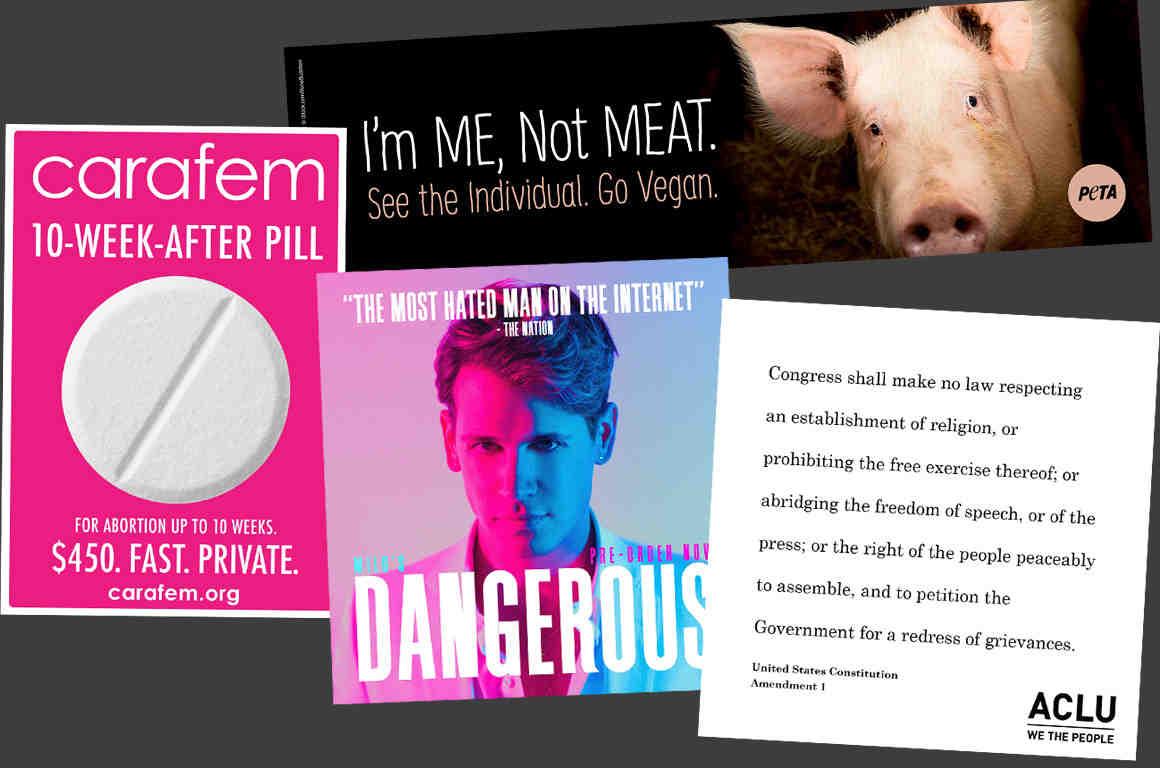ACLU sues DC Metro system for rejecting 'issue oriented' ads
The American Civil Liberties Union has sued the Washington Metropolitan Transportation Authority, alleging that its restrictions on “issues-oriented” or controversial advertising on Metro trains and buses violates the First Amendment, the Washington Post reports.
The lawsuit (PDF), filed in federal court in Washington, D.C., is on behalf of four plaintiffs spanning a broad spectrum: PETA; alt-right writer Milo Yiannopoulos, abortion pill provider Carafem; and the ACLU itself.
Ads by those individual groups were either rejected immediately or later taken down after rider complaints.
“In its zeal to avoid hosting offensive and hateful speech, the government has eliminated speech that makes us think, including the text of the First Amendment itself,” says ACLU senior staff attorney Lee Rowland in a statement.
Rowland was referring to the ACLU’s ad, which had simply carried the text of the First Amendment, under the organization’s logo, in three languages: English, Spanish and Arabic.
The Metro system, after a number of controversies over advertisements, in 2015 created a broad guideline for rejecting adds that are “intended to influence members of the public regarding an issue on which there are varying opinions,” the lawsuit said.
Washington D.C. is ground zero for political controversies and statements, and Metro’s ads grab the eyes of approximately 90 percent of those in the metro area who live and work in the area on a daily basis, the suit says.
The other three examples of ads by plaintiffs in the suit:
- • Carafem’s proposed ad for its FDA-approved medication: “10-week-after pill. For abortion up to 10 weeks. $450. Fast. Private.”
• PETA’s intended ad: An image of a pig with this text: “I’m ME, Not MEAT. See the Individual. Go Vegan.”
• The add, removed after 10 days because of rider complaints, for provacteur Yiannopoulos’s book Dangerous, different ads using one of four quotes from various publications, such as “The Kanye West of Journalism,” and “The most hated man on the internet.”
While politics dominate the issues for WMTA, in New York the problem is sex, explicit and through entendre, the New York Times reported Inn 2015.
The New York subway system has carried ads showing the results of breast enhancement and for extra-large condoms, but the company that sells ads rejected a picture of a pants-less woman with her legs wrapped around a shirtless man.
After periodically dealing with controversy over the years, the WMTA in Washington developed its new guideline in 2015 when a controversial pro-Israel group called the American Freedom Defense Initiative wanted to post ads with a caricature of the prophet Muhammad. It was soon after the same cartoon prompted a death when two men opened fire outside an event displaying the item.
The WMTA does “seem to be acting pretty inconsistently, and they seem to not have a clear policy,” says Rebecca Tushnet, who teaches First Amendment law at Harvard Law School, told the Washington Post. She adds that “you can’t have your standards for what is allowable based on the identity of the person in the advertisement.”
Tushnet suggests a tighter, clearer policy.
Advertising is expected to bring in $24 million this year for the WMTA, and officials are trying to increase that. But at the same time, Metro “intends to vigorously defend its commercial advertising guidelines, which are reasonable and viewpoint neutral,” says spokeswoman Sherri Ly.




